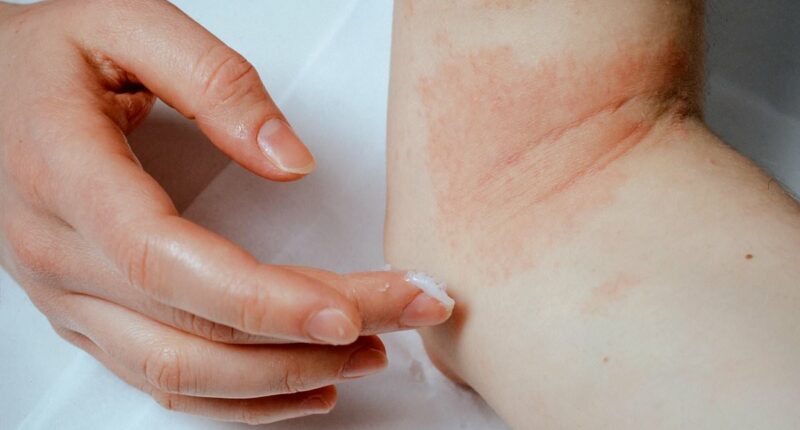Share this @internewscast.com
Adults who have the most prevalent type of eczema are notably more prone to harboring suicidal thoughts, as revealed by recent research released today.
Atopic eczema is a common inflammatory condition that causes patches of itchy, cracked and dry skin, which can blister and bleed during a flare-up.
At the European Academy of Dermatology Congress in Paris, prominent dermatologists investigated the relationship between atopic eczema and suicidal thoughts among over 30,800 adults spanning 27 countries.
As one of the largest investigations of its kind, the study included over 15,200 people suffering from the condition, matched with 7,968 controls.
Eczema patients were grouped based on when they were diagnosed with the condition—childhood, adolescence or adulthood.
Participants were required to fill out a survey that documented the intensity of their symptoms, experiences of skin-related prejudice, and any history of suicidal ideation.
Findings indicated that slightly more than 13 percent of individuals with the condition reported experiencing suicidal thoughts, in contrast to just 8.5 percent of those without atopic eczema, independent of when symptoms began.
Dr. Delphine Kerob, a dermatologist and contributing lead author, commented: ‘These findings illustrate that atopic eczema’s impact extends beyond the surface, with suicidal thoughts being a serious and pervasive issue that often escapes the attention of healthcare providers.’

More than 5.2million adults and 2.5million children in the UK currently suffer from moderate to severe cases of eczema
‘By pinpointing the primary risk factors for suicidal ideation within this group, we hope this research will aid healthcare professionals in better identifying and addressing these issues, thereby enhancing patients’ overall well-being more effectively.’
Beyond the physical symptoms of the condition, its impact on mental health is increasingly recognised, alongside the associated risks of available treatment methods such as topical steroids.
Many who suffer from the condition experience debilitating anxiety, depression and social stigma, alongside the daily challenges of managing their condition.
As such, younger adults, particularly those under 30, were more likely to report suicidal thoughts, as were individuals with obesity.
Clinical features were also found to play a major role, with moderate to severe symptoms linked to an increased risk of suicidal thoughts.
Researchers also noted that those who struggled with consistent sleep disorders, such as mixed insomnia—difficulty falling and staying asleep—and more stigmatisation were at a higher risk of such ideations.
Dr Kerobe concluded: ‘These findings reveal a critical insight from our study, which seeks to uncover the hidden, long-term impact of living with common inflammatory skin conditions such as atopic eczema.’
More than 5.2million adults and 2.5 million children in the UK are thought to suffer from moderate to severe cases of eczema.

A close-up view of Atopic Dermatitis, also known as atopic eczema, one of the most common forms of eczema
The condition is generally first treated with prescription washes and steroid creams to reduce swelling and redness. In more severe cases, immunosuppressant drugs – which can negatively affect immunity and the liver – are given.
Professor Tony Bewley, a consultant dermatologist at Bart’s Health NHS Trust in London, added: ‘Atopic dermatitis often has a greatly underestimated psychosocial burden for the patients and their families’
‘Both adults and children frequently face stigmatisation, loss of confidence and bullying, sleep deprivation and overwhelming itch, which may impact their performance at school and work.
‘In severe atopic dermatitis, patients often suffer from depression, anxiety and even suicidal ideation.’
Last year, the NHS announced the roll-out of a pioneering new jab called lebrikizumab which soothes painful symptoms by targeting a protein in the body that causes inflammation.
Prof Bewley welcomed the new treatment that is now available on the NHS, saying: ‘The addition of this therapy is an important step forward and most welcomed for patients and clinicians alike.’














